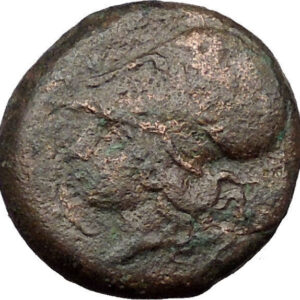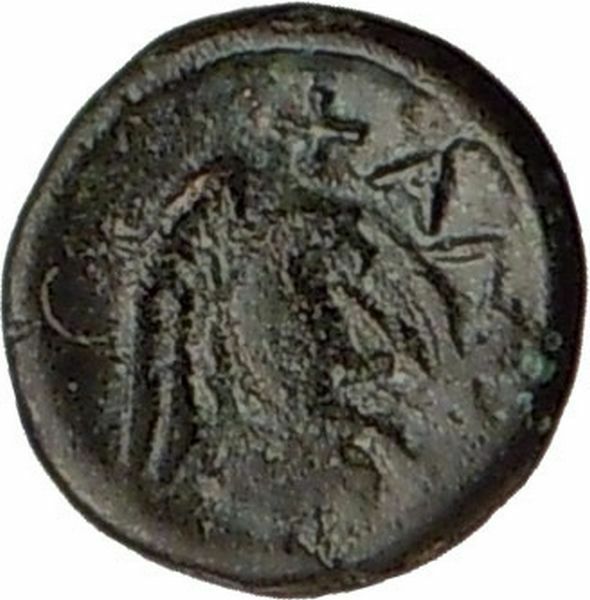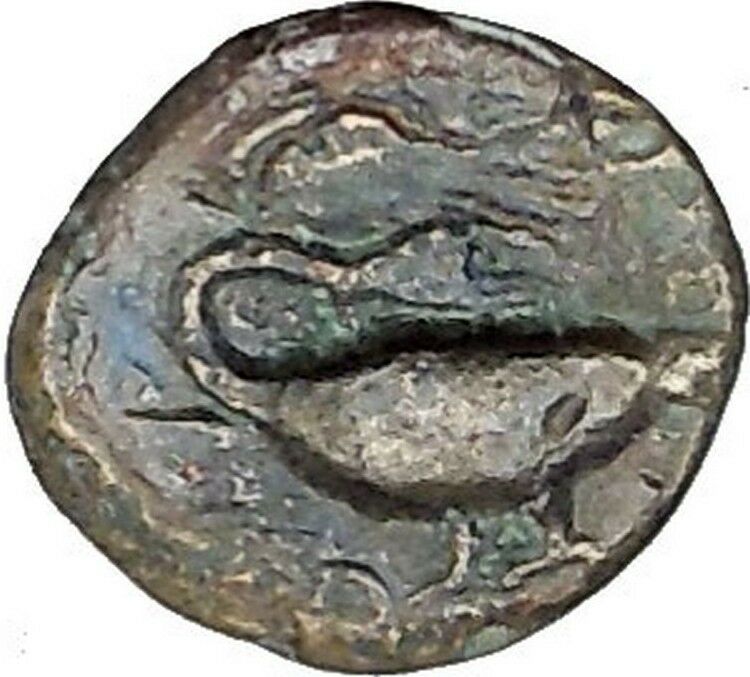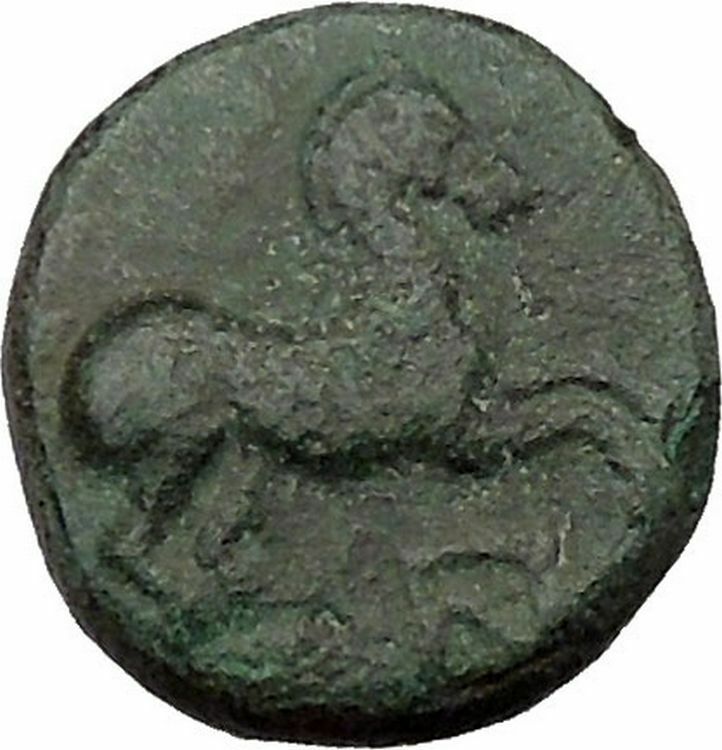|
Greek city of Tarentum (Taras) in Calabria
Silver Didrachm or Nomos 17mm (6.34 grams) Struck circa 272-240 B.C. Eyr- and Damokritos, magistrates.
Reference: Vlasto 916; HN Italy 1043.
Youth on horseback right; behind, Nike flying right crowning youth; EYP before, Δ-AMOKR-ITOΣ below.
Phalanthos riding dolphin right, holding trident and cornucopia; monogram behind.
Tarentum, called Taras by the Greeks, an important Greek city in Italy, situated on the west coast of the peninsula of Calabria, on a bay of the sea, about 100 stadia in circuit, forming an excellent harbor, and being a portion of the great Gulf of Tarentum. The city stood in the midst of a beautiful and fertile country, south of Mt. Aulon and west of the mouth of the Galaesus. It was originally built by the Iapygians, who are said to have been joined by some Cretan colonists from the neighboring town of Uria, and it derived its name from the mythical Taras, a son of Poseidon. The greatness of Tarentum, however, dates from B.C. 708, when the original inhabitants were expelled, and the town was taken possession of by a strong body of Lacedaemonian (Spartan) Partheniae under the guidance of Phalanthus. It soon became the most powerful and flourishing city in the whole of Magna Graecia, and exercised a kind of supremacy over the other Greek cities in Italy. It carried an extensive commerce, possessed a considerable fleet of ships of war, and was able to bring into field, with the assistance of its allies, an army of 30,000 foot and 3,000 horses. The city itself in its most flourishing period contained 22,000 men capable of bearing arms. The government of Tarentum was different at various periods. It first was forced to surrender to the Romans in B.C. 272 and then again retaken by them in 207 B.C. after siding with the Carthaginians and their general Hannibal during the second punic war and was thus punished.
You are bidding on the exact item pictured, provided with a Certificate of Authenticity and Lifetime Guarantee of Authenticity.
Taranto was founded in 706 BC by Dorian Greek immigrants as the only Spartan colony, and its origin is peculiar: the founders were Partheniae, sons of unmarried Spartan women and Perioeci (free men, but not citizens of Sparta); these unions were permitted by the Spartans to increase the number of soldiers (only the citizens of Sparta could become soldiers) during the bloody Messenian wars, but later they were nullified, and the sons were forced to leave. Phalanthus, the parthenian leader, went to Delphi to consult the oracle: the puzzling answer designated the harbour of Taranto as the new home of the exiles. The Partheniae arrived in Apulia, and founded the city, naming it Taras after the son of the Greek sea god, Poseidon, and of a local nymph, Satyrion. According to other sources, Heracles founded the city. Another tradition indicates Taras as the founder of the city; the symbol of the Greek city (as well as of the modern city) depicts the legend of Taras being saved from a shipwreck by riding a dolphin that was sent to him by Poseidon. Taranto increased its power, becoming a commercial power and a sovereign city of Magna Graecia, ruling over the Greek colonies in southern Italy. Its independece and power came to an end as the Romans expanded throughout Italy. Taranto won the first of two wars against Rome for the control of Southern Italy: it was helped by Pyrrhus, king of Greek Epirus, who surprised Rome with the use of elephants in battle, a thing never seen before by the Romans. The second war was conversely won by Rome, that afterwards cut off Taranto from the centre of Mediterrean trade, by connecting the Via Appia directly to the port of Brundisium.
Calabria (Greek: Καλαβρία), in Antiquity known as Bruttium, is a region in southern Italy, south of Naples, located at the “toe” of the Italian peninsula. It is bounded to the north by the region of Basilicata, to the south-west by the region of Sicily, to the west by the Tyrrhenian Sea, and to the east by the Ionian Sea. The region covers 15,080 km² and has a population of 2 million. The regional capital is the city of Catanzaro. The other two main cities are Reggio Calabria and Cosenza. The demonym of Calabria is Calabrian (Italian: calabrese).
Calabria was first settled by Italic Oscan-speaking tribes. Two of these tribes included the Oenotri (roughly translated into the “vine-cultivators”) and the Itali. Greek contact with the latter resulted in the entire pela (modern Italy) taking the name of the tribe.
Greeks settled heavily along the coast at an early date and several of their settlements, including the first Italian city called Rhegion (Reggio Calabria), and the next ones Sybaris, Kroton (Crotone), and Locri, were numbered among the leading cities of Magna Graecia during the 6th and 5th centuries BC.
|










